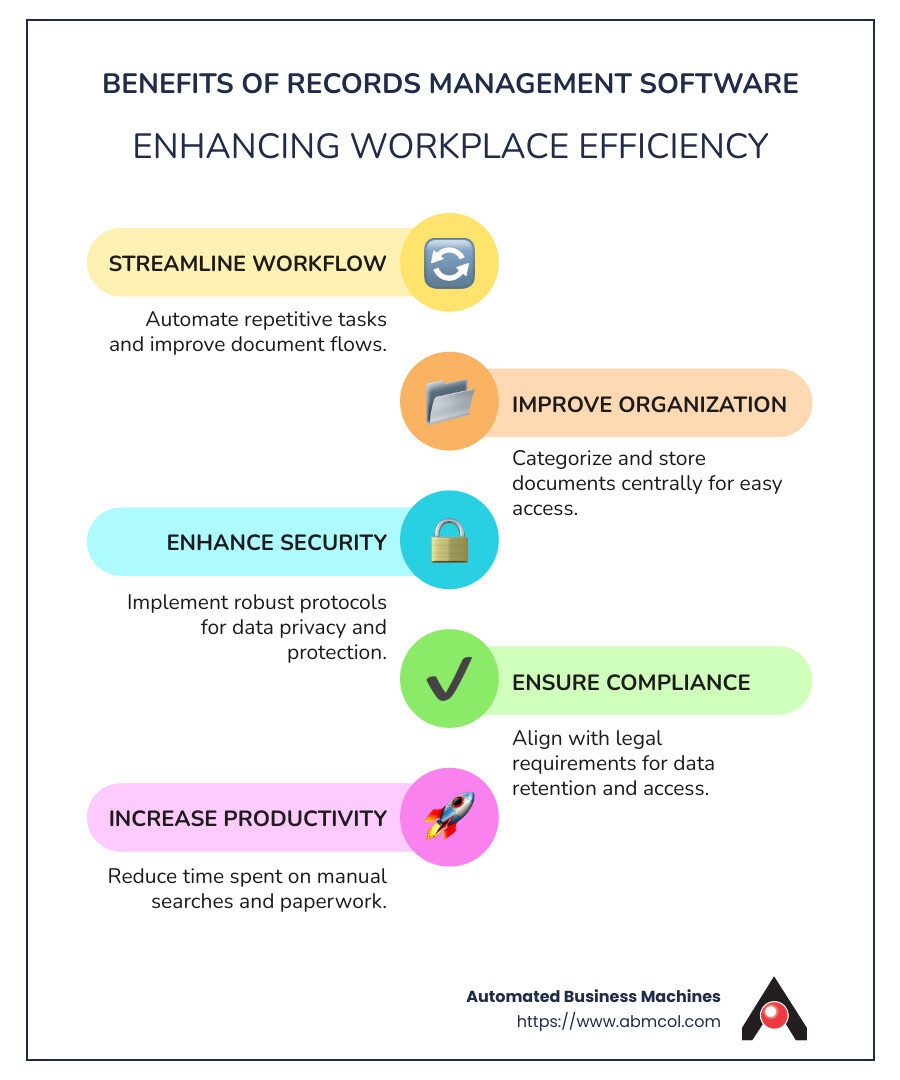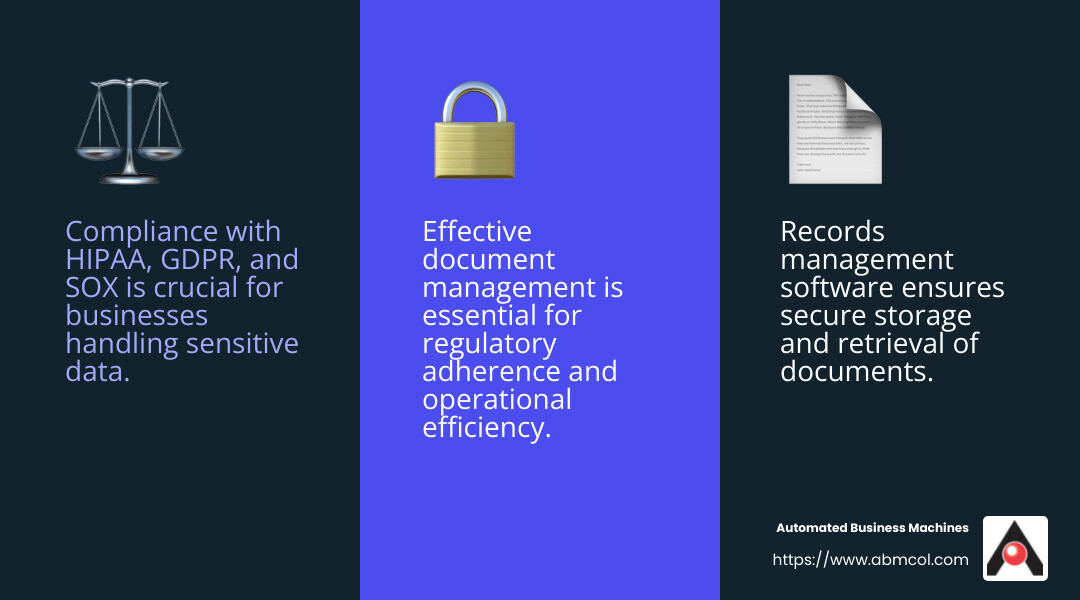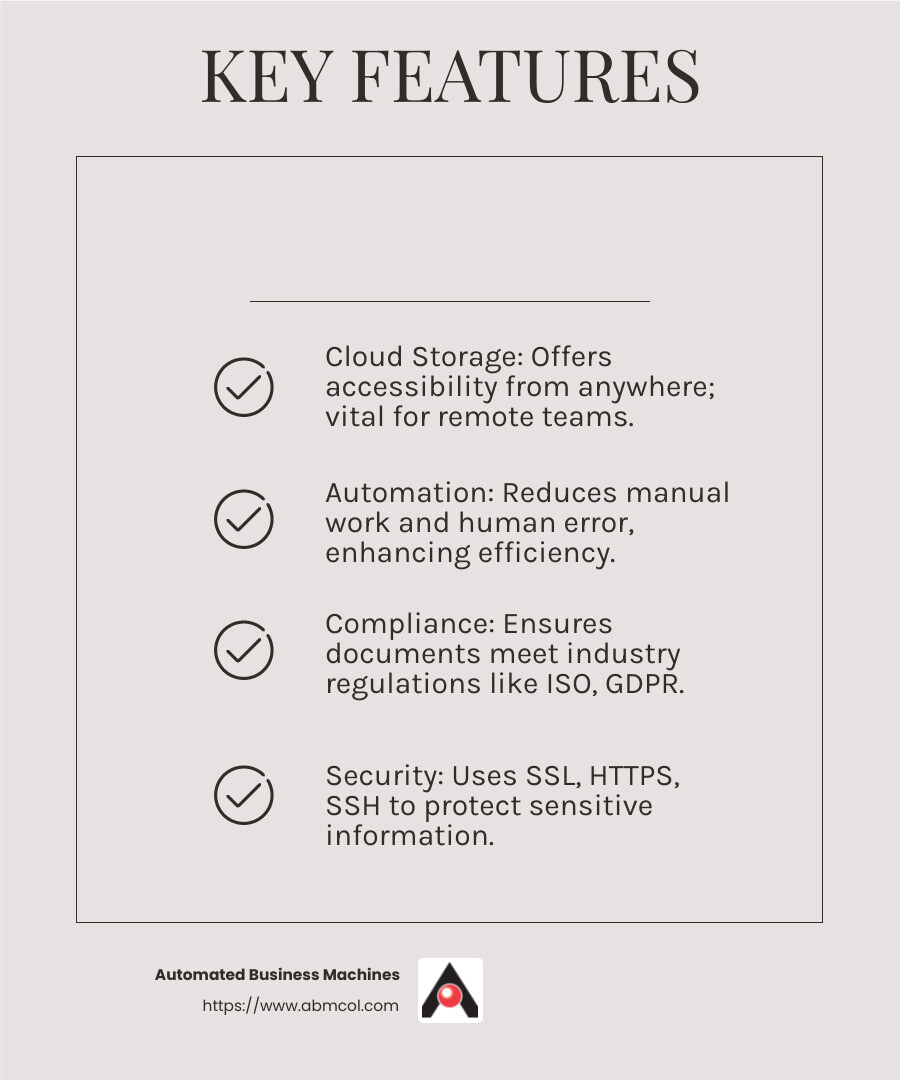
Records management software serves as a vital component for enhancing digital workflows in modern office environments. This software aids businesses in organizing and safeguarding information while simplifying access, ensuring regulatory compliance, and boosting operational efficiency.
Here’s a quick look at what records management software can do for you:
- Streamline Workflow: Automate repetitive tasks and document flows.
- Improve Organization: Efficiently categorize and store documents in a central, accessible location.
- Improve Security: Implement robust protocols for data privacy and protection.
- Ensure Compliance: Align with legal requirements for data retention and access.
- Increase Productivity: Reduce time spent on manual searches and paperwork.
Implementing effective records management software is essential for tech-savvy office managers aiming to improve productivity while managing costs. These tools offer seamless integration with existing systems, providing the digital backbone necessary to transform outdated processes into efficient, cutting-edge operations.
Understanding Records Management Software
Records management software is a critical tool for businesses that want to keep their documents organized, accessible, and secure. At its core, this software helps manage documents throughout their lifecycle—from creation to secure destruction.
Definition: Records management software is a digital solution designed to store, organize, and manage documents and records. It allows businesses to maintain control over their information, ensuring that data is stored securely and can be easily retrieved when needed.
Compliance: Compliance is a major reason businesses invest in records management software. Industries like healthcare, finance, and public companies must adhere to strict regulations such as HIPAA, GDPR, and SOX. These frameworks demand meticulous recordkeeping to ensure data integrity and privacy. For example, healthcare entities in the U.S. must use software that complies with HIPAA to handle electronic health records securely. Similarly, businesses handling EU residents’ data must follow GDPR regulations to protect individual privacy rights.
Document Management: Beyond compliance, records management software simplifies document management. It automates the categorization and storage of documents, making them easily searchable. Advanced features like AI-powered indexing in systems such as DocuPhase enable automatic tagging of documents, which speeds up retrieval.
These systems also support multiple file formats, allowing for seamless integration with various business processes. For instance, Laserfiche enables users to automate workflows and classify metadata, ensuring documents are consistently managed and easy to find.
In summary, records management software is not just about storing data—it’s about changing how businesses handle information. By ensuring compliance, improving organization, and enhancing document management, these tools are indispensable for modern businesses striving to streamline operations and protect their data assets.
10 Best Records Management Software Solutions
Finding the right records management software can transform how a business handles its information. Let’s explore ten standout solutions that can help you streamline your records management.
1. SafetyCulture
SafetyCulture is an award-winning tool used across industries for creating and managing checklists for audits and inspections. It’s perfect for businesses looking to manage processes and legal requirements efficiently. With cloud storage, SafetyCulture ensures easy access to records anytime and anywhere, even offline. You can integrate it with sensors for real-time monitoring, making it a versatile choice for dynamic environments.
2. FileHold
FileHold is ideal for businesses transitioning to a paperless system. It offers cloud hosting and integrates seamlessly with Microsoft Office products. FileHold captures records’ data and usage history, ensuring you have a comprehensive view of your documents’ lifecycle. It’s a robust choice for companies seeking a traditional yet efficient approach to digital records management.
3. fileplan
fileplan is a cloud-based solution that simplifies managing records, emails, and documents. It helps businesses track their documents from creation to archiving without any fuss. With a focus on efficiency and productivity, fileplan is perfect for organizations looking to streamline their records office operations.
4. ZenQMS
ZenQMS stands out for its focus on quality management in regulated industries. It offers features like document control, training management, and audit management. ZenQMS helps businesses ensure compliance with industry standards, making it a go-to solution for those in highly regulated sectors.
5. Happeo
Happeo is more than just a records management tool; it’s an online workspace that fosters collaboration. It allows teams to create and manage documents in compliance with internal standards. Happeo’s integration with various workflow software makes it an excellent choice for businesses prioritizing teamwork and communication.
6. Kontainer
Kontainer is a digital asset management system that excels in organizing and sharing media files. It’s particularly useful for businesses dealing with large volumes of visual content. With features like metadata management and file sharing, Kontainer helps streamline the management of digital assets.
7. DocuPhase
DocuPhase offers a comprehensive suite with AI-powered indexing and workflow automation. It shines in accounts payable automation, helping businesses track invoices and match purchase orders. With its robust search functions, DocuPhase is ideal for companies looking to improve their document management efficiency.
8. Laserfiche
Laserfiche provides a complete enterprise content management suite with strong automation features. It allows users to classify, hold, and retain documents to meet compliance requirements. Laserfiche is perfect for businesses needing a versatile tool that supports various file types and formats.
SharePoint is a well-known platform for collaboration and document management. It allows businesses to create custom workflows and manage documents across teams. With its integration capabilities, SharePoint is a reliable choice for organizations looking to improve their internal communication and document handling.
10. DocSavy
DocSavy is designed for simplicity and efficiency in document management. It offers features like document sharing, version control, and secure access. DocSavy is a great option for small to medium-sized businesses seeking an intuitive and cost-effective records management solution.
Choosing the right records management software depends on your business needs and industry requirements. Whether you need robust compliance features or a user-friendly interface, there’s a solution here to help you manage your records effectively.
Key Features of Records Management Software
Choosing the right records management software can transform how your business handles documents and data. Let’s explore the key features that make these systems essential for modern businesses.
Cloud Storage
Cloud storage is a game-changer for records management. It allows your business to store vast amounts of data without worrying about physical space. Plus, cloud storage offers accessibility from anywhere, ensuring that your team can retrieve documents whenever needed. This feature is crucial for businesses with remote teams or multiple office locations, like those in Georgia.
Automation
Automation in records management means less manual work and more efficiency. Tasks like document routing, approval processes, and notifications can be automated, freeing up valuable time for your team. For example, DocuPhase uses AI technology to automate workflows, making it easier to manage documents and reduce human error.
Compliance
Compliance is non-negotiable for many industries. Records management software helps ensure your documents meet industry standards and regulations. ZenQMS, for instance, supports compliance with ISO, GDPR, and HIPAA standards, making it essential for businesses in regulated sectors. This feature helps avoid costly penalties and keeps your company aligned with legal requirements.
Integration
Integration capabilities allow records management software to work seamlessly with other tools your business uses. Happeo, for example, integrates with Google Workspace and Microsoft 365, allowing for smooth data flow and collaboration. This means you can manage records without disrupting your existing workflows, making the transition to a digital system much smoother.
Security
Security is paramount when managing sensitive information. With cloud-based solutions, it’s crucial to have strong security measures in place. Platforms like PrintReleaf use SSL, HTTPS, and SSH data transmission to protect your data. Ensuring your records are securebuilds trust with clients and partners, protecting your business from data breaches and unauthorized access.
These features make records management software an invaluable tool for businesses. By leveraging cloud storage, automation, compliance, integration, and security, companies can streamline their operations and focus on what truly matters.
Benefits of Digital Records Management
Switching to digital records management can significantly boost your business’s performance. Here’s how:
Efficiency
Digital systems streamline document handling. Instead of sifting through piles of paper, employees can locate records with just a few clicks. This saves time and reduces errors. In fact, businesses using automated systems like DocuPhase report up to 40% faster document retrieval. This efficiency allows your team to focus more on core tasks and less on administrative duties.
Cost Reduction
Storing paper documents isn’t cheap. Physical storage costs add up quickly with expenses for space, supplies, and maintenance. Digital records management slashes these costs by moving your files to the cloud. According to industry insights, businesses can save up to 70% on storage costs by going digital, freeing up resources for other investments.
Accessibility
With digital records, your documents are accessible anytime, anywhere. This is especially beneficial for businesses with multiple locations or remote teams. Employees can access the information they need without delays, leading to quicker decision-making and improved collaboration. For example, SafetyCulture’s cloud-based solution allows teams to access documents on the go, ensuring seamless operations.
Legal Compliance
Staying compliant with industry standards and regulations is crucial. Digital records management software helps maintain compliance by organizing and storing records according to legal requirements. Systems like ZenQMS ensure that your records meet standards such as ISO and HIPAA, reducing the risk of legal issues and penalties. This peace of mind lets you focus on growing your business without worrying about regulatory pitfalls.
By embracing digital records management, companies can improve efficiency, cut costs, improve accessibility, and ensure legal compliance, setting the stage for sustainable growth and success.
Frequently Asked Questions about Records Management Software
Which software is best for record keeping?
Choosing the best records management software depends on your business needs. Here are some popular options:
- ClickUp: Known for its user-friendly interface, ClickUp is ideal for teams looking for a versatile tool that combines task management with document storage. It’s great for businesses that need to keep everything organized in one place.
- FileHold: Perfect for large companies, FileHold offers robust features for document control and compliance. It’s customizable to suit specific organizational needs, making it a go-to for enterprises with complex document management requirements.
- DocSavy: This software is designed for efficiency and ease of use. DocSavy automates document workflows and provides secure storage, making it a solid choice for businesses looking to streamline their document processes.
- Veeva Vault: Custom for industries like life sciences, Veeva Vault excels in managing regulated content. It ensures compliance with industry standards, making it essential for businesses that prioritize regulatory adherence.
What is a record management software?
Records management software is a tool that helps businesses organize, store, and retrieve documents and records efficiently. It ensures that all records are accessible, secure, and compliant with legal standards.
- Organization: The software categorizes documents, making it easy to find what you need without sifting through piles of paperwork.
- Accessibility: With cloud-based solutions, records are available anytime, anywhere. This is crucial for remote teams or businesses with multiple locations.
What is an example of a record management system?
Several systems stand out for their comprehensive features and ease of use:
- DocuPhase: This cloud-based system uses AI to improve document management, offering automation and workflow integration. Businesses report significant time savings with its advanced features.
- Laserfiche: Known for its enterprise content management capabilities, Laserfiche automates workflows and supports document classification. It’s perfect for businesses looking to improve efficiency and compliance.
- SharePoint: A popular choice for many organizations, SharePoint offers document storage, version management, and retention schedules. It’s versatile and integrates well with other Microsoft tools.
- DocSavy: Mentioned earlier, DocSavy provides automated workflows and secure storage, making it an efficient choice for businesses aiming to simplify their document management processes.
By understanding these options, businesses can select the right software to improve their document management strategies and ensure seamless operations.
Conclusion
In the dynamic world of business, having the right tools can make all the difference in productivity and workflow improvement. At Automated Business Machines, we understand the importance of efficient records management software in achieving these goals.
Our solutions are designed to streamline your document processes, helping you save time and reduce errors. By integrating advanced technology, we ensure that your records are easily accessible, secure, and compliant with industry standards. This not only improves your workflow but also boosts overall productivity.
Whether you’re a small business or a large enterprise, our customized solutions cater to your specific needs, ensuring that you have the right tools to succeed. Our local presence in various Georgia locations means we’re always ready to support you with personalized service and expertise.
Ready to transform your document management processes? Explore our document management solutions and find how we can help your business thrive.



